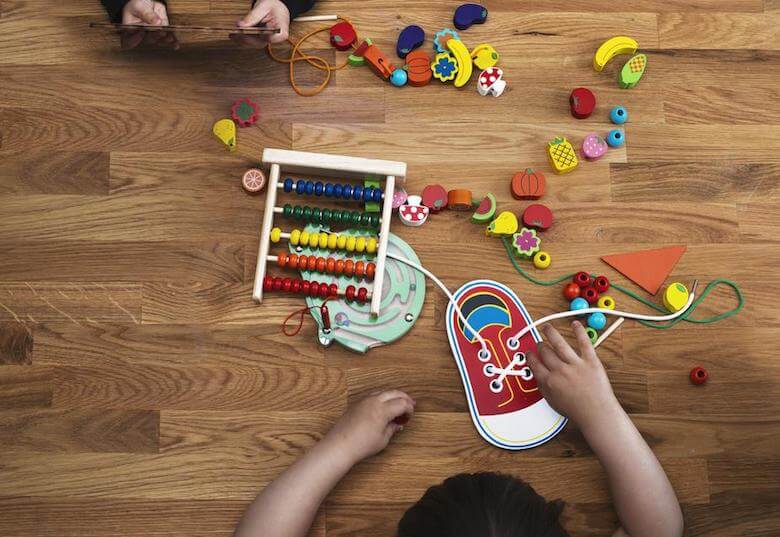
In the past, we’ve written about whether or not young children should be using electronics and media. As caregivers, we all have the best of intentions when raising a child. And of course we don’t want our kids sitting in front of a TV or using the iPad all day. But, let’s face it: sometimes, we need our little kids to stay occupied while we do our thing (housework, cooking, work, phone calls – you know what we mean).
While screen time alternatives abound on the Internet, a lot of them may require our involvement, and not just our watchful eye and nearby presence. That can be what is so attractive about TV for parents and caregivers. That said, what are screen time alternatives for kids that will keep them just as still and quiet as a TV show or video game? Below are some ideas.
Screen time alternative 1) Use homemade toys for easy games to play indoors and in the backyard
In our article about educational toys you can make from homemade materials, we discovered some interesting and fun games that can be played with simple DIY projects. These can keep kids occupied for a while, if they get into the challenge of the activity. If they’ve made the toys with you earlier, they may sense more of an attachment to them too (especially if they got to personalize them – artistically speaking). Bean bag games, bowling pins and shape-forming rocks are the types of games they can play over and over again – especially if other kids are nearby. But they also work solo too!
For the nearby outdoors, you can also use foam ‘paint’ so they can make a mess on the concrete (a washable one, don’t worry!). And of course, there’s always good ‘ol slime and homemade playdough for a table activity!
If you have the capacity for it, you can also try setting up sensory development stations, which can be found in educational daycares too.
Screen time alternative 2) Try preschool journals of many varieties
We’ve written about preschool journaling here. Journaling isn’t just for older kids, and it’s also not just for writers-at-heart. Kids can start a photography journal, a drawing journal, a sensory journal and more. The time it takes to ponder their thoughts, consider their subjects, and then document them can be a great way to stay occupied (quietly, we might add!). This is an educational activity as much as it is a fun one.
To get them going on one of your ‘busy’ hours, you can assign them a task, such as documenting all the different leaves they can find in the backyard. And then drawing the trees they came from. They can even do leaf crafts afterwards, using what they find (as an extension of this idea). Then, if that didn’t take up much time, you can send them out again for the bugs, or to their bedrooms to make a toy catalog! Or, ask them to make a storybook – pictures and words count!
Screen time alternative 3) Introduce imagination games to keep little ones active
We have an article dedicated to imagination games you can play with little kids. While some of these work great while you’re playing too, you can also use them as conversational pieces with your kids, to keep them nearby while you do something that doesn’t require full concentration. We’re thinking: cooking and cleaning, for instance. Let’s say you’re chopping vegetables, and your kid really wants your attention. You can send them into a magical, faraway land, just by talking to them! Ask them to go get their magic socks, and then keep tabs on where they’ve travelled to, what superhero they’ve morphed into and so on. You might have to pause here and there for your dramatic reactions to their surprise imaginary events, but that’s ok – it’ll be more interesting than tenderizing that chicken all alone.
If you have a play kitchen, they can also cook alongside you while playing house. And if they’ve got siblings or friends nearby, you can use that to your advantage to get them playing together.
If you have tents, costumes and spy gear on hand, your props are also taken care of, and this can be a regular go-to for your kids!
See more on our blog:
- Essential props to have or make for your preschool dramatic play corner
- What are the common types of play in childhood? Why are they important?
- Benefits of messy play in early childhood; getting dirty for fun is ok!
Screen time alternative 4) Bring out the puzzles, blocks and concentration games
Another great way to get little brain neurons going is to use puzzles, blocks and any sort of concentration game. The more complex, the better (since it’ll keep them occupied, quietly for longer, which is what we’re going for here!). Think also: building kits, memory matching cards, STEM toys, coding toys and the like (as long as they’re age appropriate of course!).
Screen time alternative 5) Kids don’t like reading? Try children’s podcasts and audiobooks instead!
We found this article mentioning 5 kids podcasts you can try. Plus, Audible.com has a whole section on early learning audio books. The Independent has ranked their 10 favourite audio books for kids too.
The great thing about audio for kids is that they’re not just a screen time alternative. They can also work for car rides or perhaps, being put to sleep too.
Screen time alternative 6) Bring the kids into the kitchen and around the house with you
We did start off saying that sometimes, you just want a screen time alternative that doesn’t involve your participation. But, what if you can convince your kids to join YOU, instead of you joining them? Teaching them how to make recipes, or rake the leaves and pluck weeks outside may not be a bad idea. They can also make for great laundry helpers and vacuumers. Sing songs, dance to music or make games out of the house chores, so the kids enjoy their time with you too.
This might be a hard sell for older kids. And, for younger kids, it may be more nuisance than a help. But, it wouldn’t hurt for them to get involved in whatever way they can (for their age). In fact, you’ll find some moms advocating for chores as part of parenting. And – if it suits your style – perhaps screen time can be a reward after the housework is done? Your call!
To conclude, we’ll also mention that screen time alternatives don’t need to be all that elaborate. Kids can learn to play by themselves! And, don’t forget, our culture of being glued to screens is recent. So it is possible for humans to not have them.
It also goes without saying that you also will need to be a role model with regards to screen time in front of your kids; if they can’t communicate properly with you while you’re focused on your phone, they’ll see that as normal. So try to avoid it when you’re around them, and keep yourself active too!
See more on our blog:
